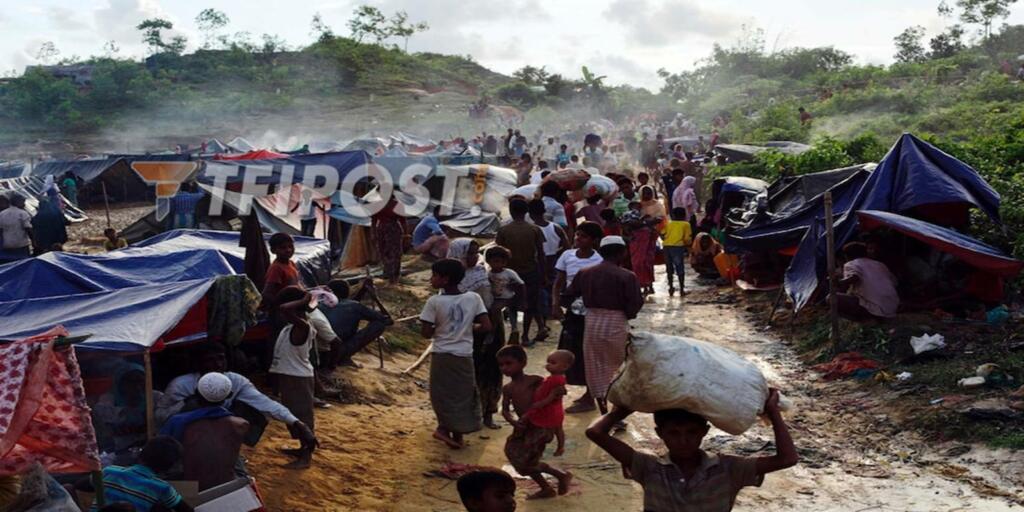Conflict in neighbouring countries and porous borders have made India a hotspot of refugees. In any religion, caste, race or region confrontation, the refugees move towards India on a mass scale. Even though the nation is neither a Party to the 1951 Refugee Convention nor the 1967 Refugee Protocol, still more than 200 Lakh illegal Bangladeshi and about 40,000 thousand Rohingyas are living in India. If quantified data is in such large numbers, the unofficial data can only be imagined.
Manesar asked illegal Rohingyas to vacate the colony
According to a report, Manesar, a municipal town in the Gurgaon District of Haryana and a part of the National Capital Region has forced at least 500 Rohingyas to vacate their land. The report citing the local population alleged that in recent times there was an unprecedented rise in criminal activities in the town after the settlement of Rohingyas in the area.
Considering the deteriorating law and order situation, a mahapanchayat was called by Devender Singh. After which, a consensus deliberation was passed to allow only those who would show valid residency documents to stay. In the community policing case, the illegal Rohingyas had to leave the place.
Read More: Dear Amit Shah, NRC & CAA can wait, kick the Rohingyas out first
Breeding illegal population in India
For the people of Manesar, this may be counted as a relief but now the illegal Rohingyas will breed in other parts of the country and will affect the socio-economic balance of other places.
Hunger can make a thief out of any man. Rohingyas are a economically disadvantageous population and socially vulnerable to being involved in criminal and other illegal activities. To sustain their life in the foreign country, they can get to any extent endangering the local population.
India is not a signatory to the UN convention relating to the Status of Refugees, 1951 and Refugees Protocol 1967. It has no international obligation towards any refugee crisis. Further, the legal inclusion of foreigners in India is provided by statutory laws like the Foreigners Act, 1946 and The Citizenship Act, 1955.
Also Read: The bulldozer model is the only solution for Jahangipuri-like incidents
Even being free from international obligation, India since its independence has become the breeding ground for the illegal population from the neighbouring countries. Millions of illegal refugees have not only settled on the land for a living but also hijacked the limited food and jobs available for Indians. They have made various government documents illegally and are not only posing a serious security threat but are also polluting the land and other resources of Indians.
Illegal Rohingyas and Bangladeshis in Delhi NCR
Various reports suggest the involvement of Rohingya Muslims in organized crime like drugs, human & cattle trafficking, prostitution, fake currency circulation, etc. Further, they are also very much associated with the local criminals and indulge in theft, murder, robbery, and kidnappings. In July 2021, the Ministry of Home Affairs said that the illegal Rohingya population pose a serious threat to national security. Confirming the prediction of the Ministry of Home Affairs, the April 2022 Jahangirpuri violence has also been attributed to the Rohingyas by the local population.
'हम हिन्दुस्तानी है हमारी कौन सुनेगा? ये रोहिंग्या ने मूर्ति पर पथराव किया, और तिरंगे का अपमान किया '#DelhiRiots victim to @rishav_dhanraj ,@vishalpandeyy_ & @Realchandan21 of @jankibaat1 pic.twitter.com/HdQkS2DjVC
— Pradeep Bhandari(प्रदीप भंडारी)🇮🇳 (@pradip103) April 16, 2022
Using the faultlines of Indian politics, they have gained the support of demagogues and anti-India forces. Patronized by these groups, Rohingyas are now actively involved in various political issues and influencing government policies. The National Capital Region has become the center point of illegal Rohingya and Bangladeshi inhabitants.
Support TFI:
Support us to strengthen the ‘Right’ ideology of cultural nationalism by purchasing the best quality garments from TFI-STORE.COM
